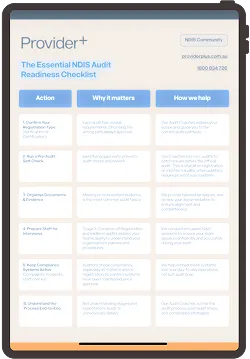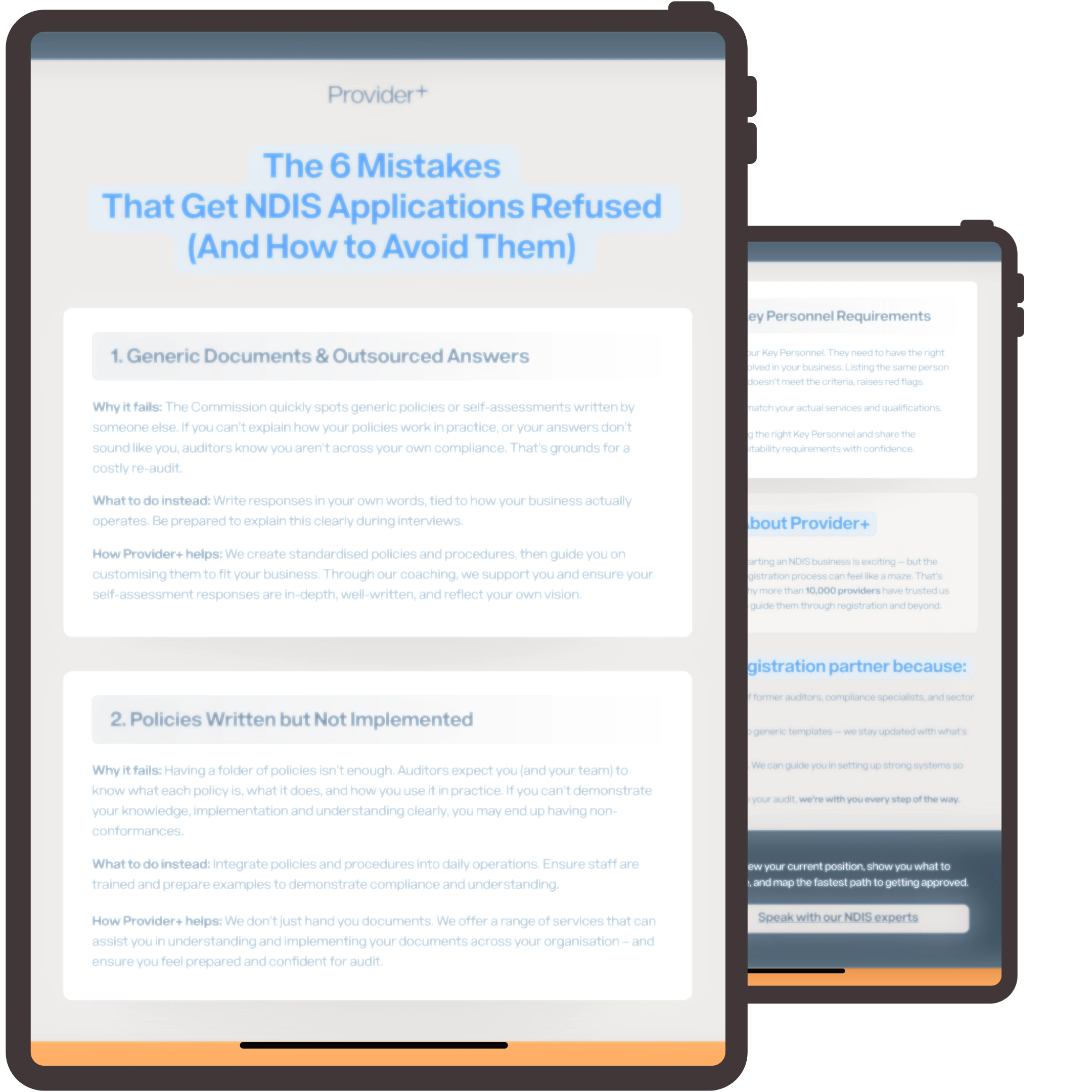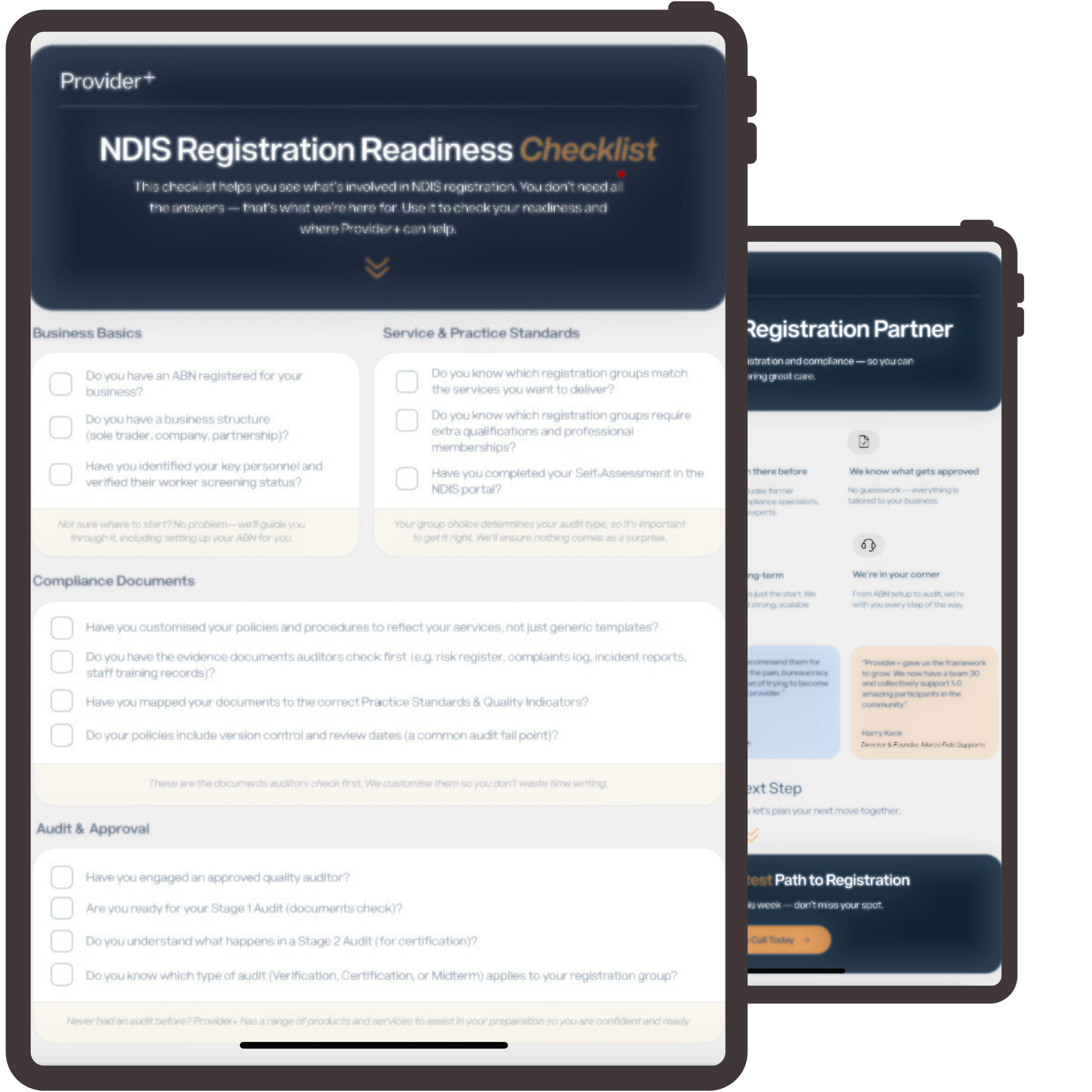How to Write an NDIS Business Plan: Step-by-Step Guide for Providers
Understanding the Importance of an NDIS Business Plan
When considering starting or expanding an NDIS business, knowing how to write a Business Plan is crucial. A well-crafted and comprehensive Business Plan not only guides your business strategy but also assists with securing funding and is an important part of provider registration.
With Provider+, choose clarity over confusion with our expert consultants and gain access to the tools, insights and support in building a thriving NDIS business. Let’s walk through the essentials of creating a business plan that sets you up for success.
What is a Business Plan and why is it important?
A Business Plan is a blueprint, or a ‘roadmap’ of how your business will run. It documents a clear vision for your business — your business goals, values and methodologies. It enables you to track your organisation’s progress and achievements. Importantly, a well-crafted Business Plan assists you to attract funding from banks or other lenders/investors if you wish to expand your business now or in the future.
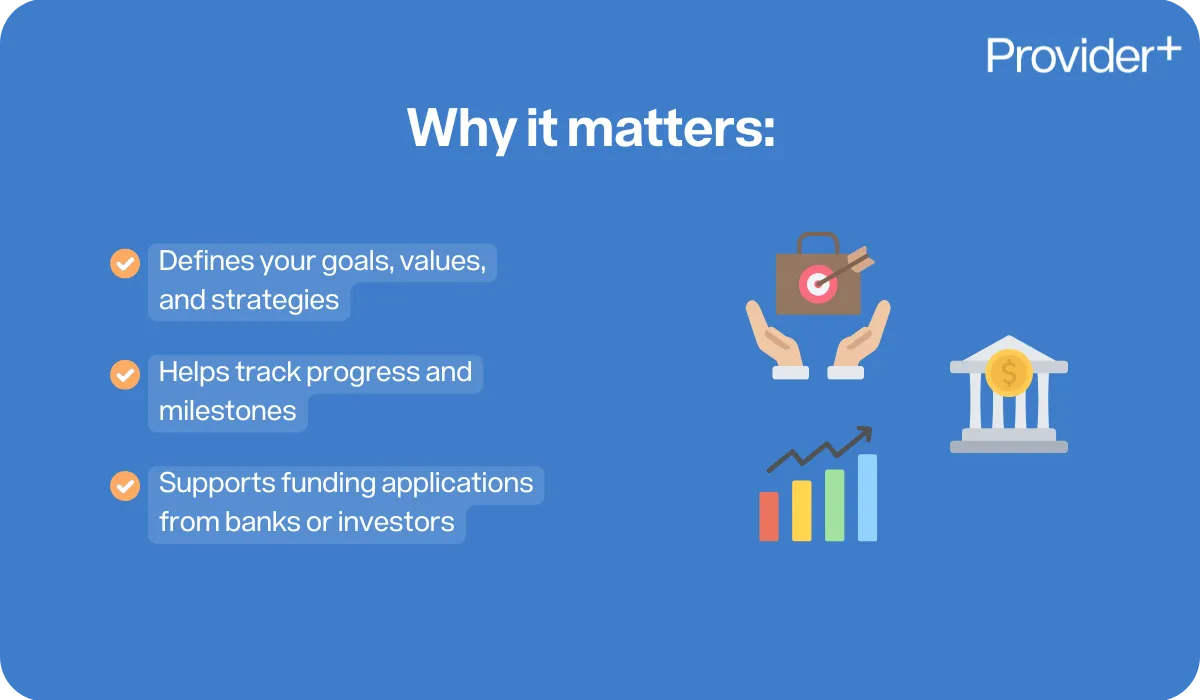
What is Included in a Business Plan?
Your Business Plan should include detailed information on all aspects of your business — including the industry you are in, the current and projected economic and business environment, the services you offer, your marketing strategy and any marketing targets that you want to meet.
It should include your financial projections — revenue, turnover and expenditure. You may need to engage an accountant to assist you with this part of writing your Business Plan. Your Business Plan should also list your Key Personnel and their roles.
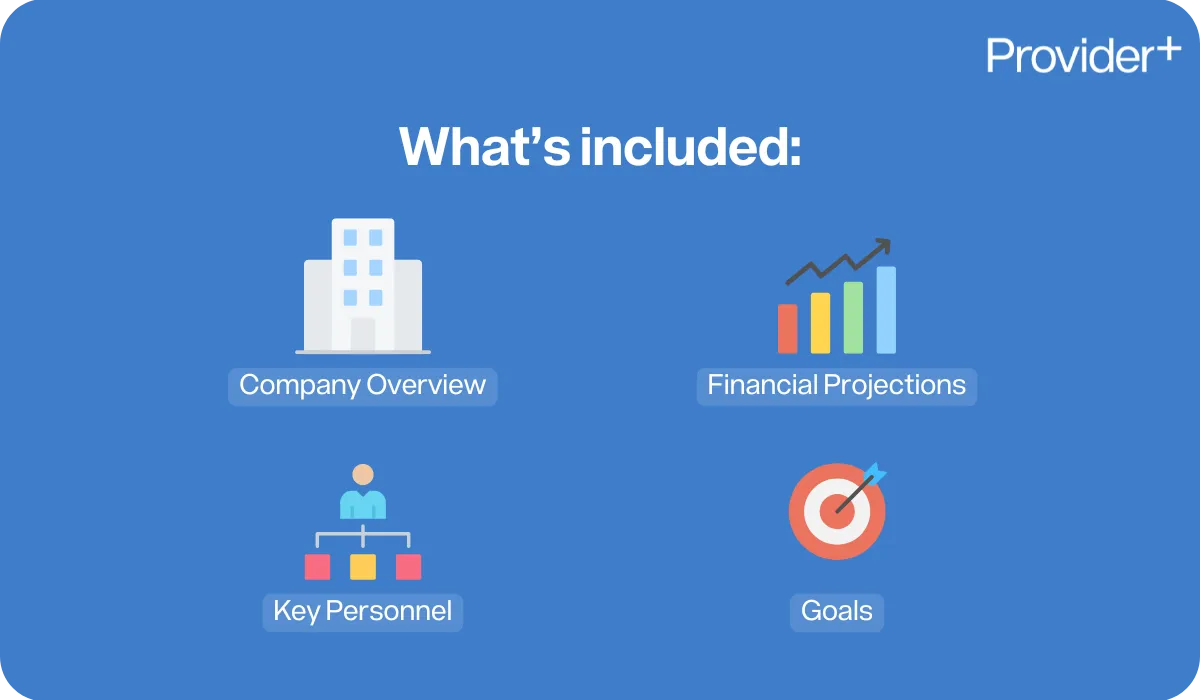
The Basics of an NDIS Business Plan
Identifying your Organisation’s Mission, Vision and Values
The first step in writing a Business Plan is to clearly define your organisation’s vision, mission and values. Documenting a clear, overarching vision for what your business is setting out to achieve is critical to drive your business and articulate your business goals both internally and externally. Are you aiming to provide specific services under NDIS, or are you looking to cater to a broader range of needs within the disability sector? This clarity will guide every decision you make — from the services you offer, your day-to-day operations, to your marketing strategies.
Your Business Plan should encapsulate your organisation’s mission. In other words, what are your business methodologies and how does this contribute to the local community or society more generally?
What are the values that underpin your business? This includes your ethical principles, cultural values and business ‘norms’. These should be articulated clearly in your Business Plan and will guide operations — from the top down — to achieve business objectives.
Understanding your Market
A key component in your NDIS Business Plan is conducting thorough market research. A useful tool for this is the SWOT (strengths, weaknesses, opportunities and threats) analysis. What are the needs and goals of your clients, the NDIS participants? What are the difficulties and challenges that NDIS participants are confronted with? How does this translate to the risks and opportunities in your business? Your SWOT analysis will help you carve out a unique space for your business in the NDIS market.
Next, take a look at the existing market competition. Who are the other providers out there? What services are already being offered? Where do the opportunities lie for your business to stand out? What are potential threats and weaknesses? What are the risks your business faces?

Structuring your NDIS Business Plan
Executive Summary
Begin your NDIS Business Plan with an executive summary. This section should highlight your business' core mission and what makes you stand out in the NDIS market. Every successful business begins with a hook, and your executive summary should grab attention and make readers – whether they're potential investors, partners, or clients – want to know more. This is an opportunity to outline your business concept, goals, and the unique value you bring to NDIS participants.
Business Description
This part of your Business Plan is where you explain your business structure. Are you operating as a sole trader, partnership, incorporated association, not-for-profit or a company structure? What are the specific services you offer? You’ll want to clearly communicate how your services align with the needs of NDIS participants, showcasing your understanding of your target audience. This section is your opportunity to convey your passion and how it translates into meaningful support for NDIS participants.
Market Analysis and Strategy
This part of your NDIS Business Plan is where you conduct thorough research to identify your target audience and understand their needs deeply. Who are the NDIS participants you aim to serve? What challenges do they face, and how can your services make a difference in their lives? Equally important is analysing your competition. Who else offers similar services, and what can you learn from them? How will you differentiate your offerings to stand out from the competition? Then, outline your marketing strategy with this knowledge. The marketing strategy should detail how you intend to reach your target audience effectively and convey the value of your services. Will you use online marketing, community engagement, or a combination of various approaches? Your strategy should be as dynamic as the market you're entering, and ready to adapt as you learn more about the needs of your clients in a changing market.
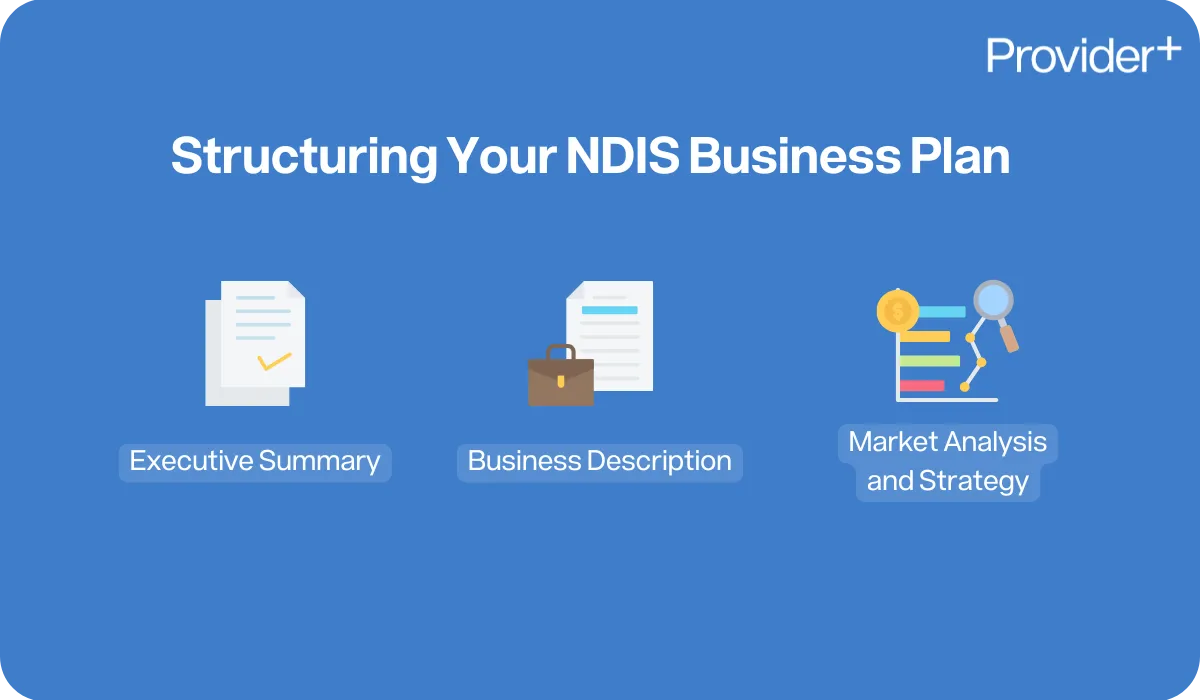
Financial Planning in your NDIS Business Plan
Budgeting and Financial Projections
Understanding the financial aspects of your business is a fundamental and critical part of business planning. Start with detailed budgeting: Outline all your expected costs—from staffing and operations to marketing and equipment. You’ll also want to consider pricing strategies. How will you price your services to be competitive yet sustainable? This requires a delicate balance, considering the cost of delivering your services, the market rate, and what your target NDIS participants can afford. Financial projections for at least the first three years are essential for a solid Business Plan. These projections should include anticipated revenue, expenses, and net profit. They give you, and any potential investors, a clear picture of your business' financial health and growth potential over time. Think of these projections as your financial goals, giving everyone involved a target to aim for.
Funding and Capital Requirements
If you are seeking funding, your NDIS Business Plan should clearly state your capital requirements. Detail how you intend to use these funds. Will they go towards expanding your services, purchasing equipment, or hiring essential staff? Be specific, as this shows potential investors or lenders exactly how their contributions will help your business grow. Next, explain the impact that this funding will have on your business. This could include expanding your reach to serve more NDIS participants, improving the quality of your services, or increasing business efficiency and sustainability. Demonstrating the potential return on investment makes your business an attractive funding prospect.

Operations Plan in your NDIS Business Plan
Service Delivery Model
An important inclusion in your NDIS Business Plan is your service delivery model. How will you ensure your services reach your clients most effectively and impactfully? This includes the logistics of your services, from the initial consultation with NDIS participants to the delivery of services and follow-up. Think about the processes you'll have to maintain to ensure safe and quality service delivery. This may include processes such as staff training, quality checks, and complaints and feedback mechanisms from your clients. Compliance with NDIS Standards should be woven into every aspect of your service delivery model, ensuring that your business thoroughly considers each element.
Staffing and Management
Your team is your most valuable asset. Your NDIS Business Plan should outline your staffing plan and recruitment strategy, including the types of roles, both worker and key personnel, required. For example, questions to consider may be: Will you need specialists in certain areas of disability support or roles focused on client relationship management? Detail your approach and commitment to staff training, development, supervision and support to demonstrate a commitment to staff personal and professional development. A well-trained, competent and motivated team is essential for delivering safe and quality services for NDIS participants. Consider including how you'll foster a positive, supportive workplace culture. Happy, engaged staff are more likely to provide the service that sets your business apart.
Risk Management and Compliance
Identifying Potential Risks
Risk management is a crucial part of your NDIS Business Plan. Identify potential risks to your business. Include things such as service delivery disruptions, unexpected cost increases. Don’t overlook external risks, including changes in NDIS legislation and regulations, health pandemics or economic downturns. Once you’ve identified these risks, detail strategies to mitigate them. For example, maintaining a flexible staffing model can help manage fluctuations in demand for your services. Establishing a solid financial buffer can protect against unforeseen expenses. Create a Plan B so your business can adapt and continue to provide safe and quality services to NDIS participants.
Compliance with NDIS Standards
Ensure your Business Plan addresses how your business will comply with NDIS Standards and regulations. It represents the quality and integrity of your services. You can include staff training programs on NDIS compliance, quality control processes to ensure service excellence and mechanisms for feedback and continuous improvement. Highlighting your commitment to comply with NDIS legislation, regulations and standards sets up your business for successful provider registration and builds trust with NDIS participants and their families. It provides assurance to stakeholders that your business is dedicated to providing safe, effective, and respectful services.
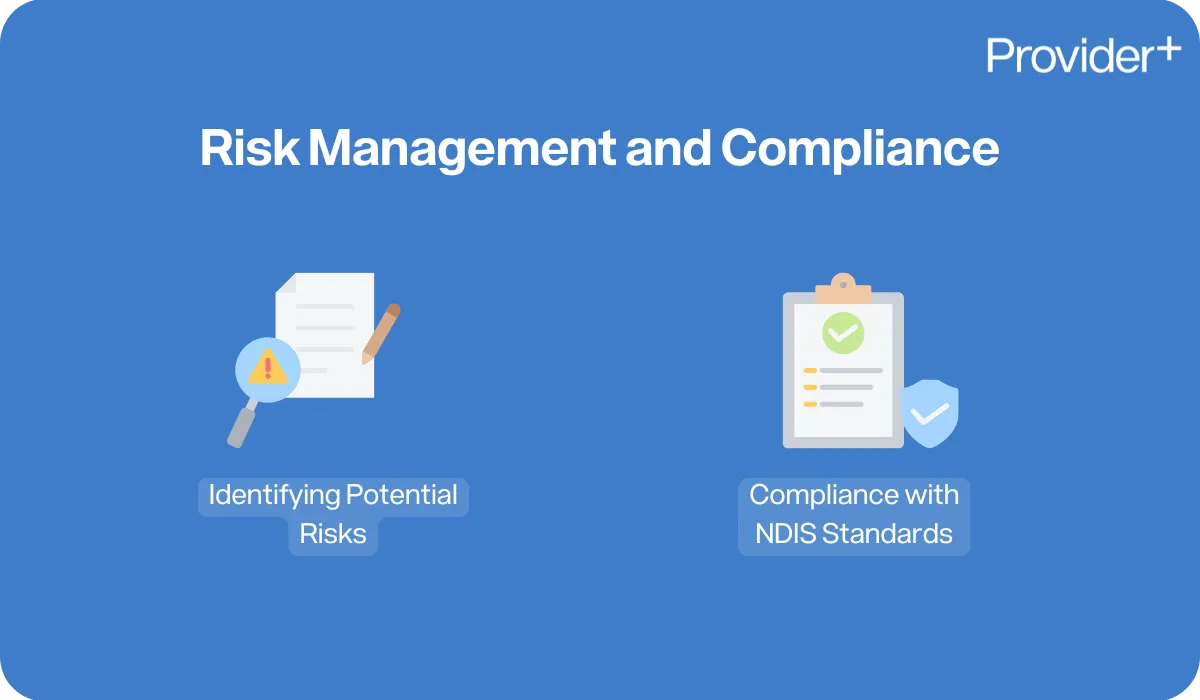
Business Plan Summary and Review
Your NDIS Business Plan should conclude with a summary of your business vision and the steps you plan to take to achieve your goals. State your short-term objectives, such as offering your services in a new area, and long-term goals, such as expanding your service offerings. This section is your chance to inspire confidence in your business’ potential for success within the NDIS framework. It’s where you reassure readers that you have a clear, actionable plan for growth and success. Highlight how your business will enrich the lives of NDIS participants by providing them with the support they need to achieve their goals.
It is important to review your Business Plan annually, for relevance, accuracy and suitability. Or more often if there are changes in the business or economic environment, or other specific trigger factors.
Mapping Out your Next Steps
Ready to make your NDIS vision a reality? Get in touch with Provider+ for support in registration, audit coaching, and more.
